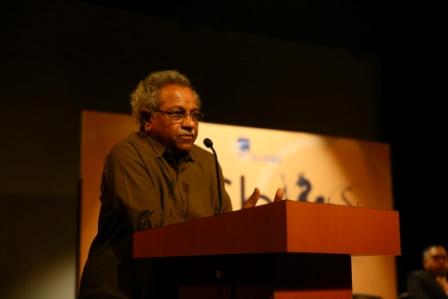Born in January, 1952, Shaji Neelakantan Karun is an Indian film director and cinematographer. His debut film ‘Piravi’ (1988) won the Caméra d’Or – Mention d’honneur at the 1989 Cannes Film Festival. He was the chairman of Kerala State Chalachitra Academy, the first academy for film and TV in India and also the executive chairman of the International Film Festival of Kerala (IFFK) from 1998 to 2001. Known for his award-winning films ‘Piravi’ (1988), ‘Swaham’ (1994), ‘Vanaprastham’ (1999) and ‘Kutty Srank’ (2009), he has won the National Award for Best Director for his debut film. He was in the city for the Indian Film Festival Bhubaneswar. In a tête-à-tête with Arindam Ganguly of Orissa Post, he threw light on his works and future plans. ‘
Q Winning national award for your your debut movie “Piravi’ which shows a somber picture of a missing man’s family (also Caméra d’Or – Mention d’honneur at the 1989 Cannes Film Festival), what you will say about that?
A First film is important for every filmmaker but more than that every filmmaker must understand that he should never focus on the success or failure of the movie. Rather, they should focus on their work. However, film-makers in the country feel the pressure of money involved in projects. This is unfortunate as quality of the film gets affected.
Q In movies like ‘Piravi’ ‘Swaham’ and ‘Vanaprastham’, you’ve focused on the theme of
death and separation. Is there any particular reason behind it?
A Each movie has varied and multiple layers. ‘Piravi’ is based on a missing son whereas ‘Swaham’ is about money. ‘Vanaprastham’ touches the theme of identity. Hence, the theme might be similar but is composed of multiple layers.
Q In a career spanning over three decades, you’ve worked only on six movies. Why is that?
A I spent a lot of time on social welfare work. I was also the chairman of Kerala State Chalachitra (Moving Picture) Academy and International Film Festival of Kerala. Working for the development of Kerala cinema took a lot of my time.
Q Your works usually touch the realms of realism. However, your recent movie ‘Olu’ delved into fantasy. Why is that?
A Every human being has dreams. For them, dream is a sort of reality. It’s a part of a human life. Even though ‘Olu’ is about a rape victim, it’s essentially a fantasy. The underlying idea behind making ‘Olu’ is that we need to dream.
Q What is the reason behind your displeasure with Cannes Film Festival?
A Earlier, the films which were screened at the fest were made by those who had undergone suffering.
The second generation, though, led a comfortable life and a comfortable way of looking at everything. They proudly say that this festival helped discover films for Oscars. But if you think Oscars is an interpretation of world cinema, let me tell you that it is just a local competition.
Q What would you say about the cinema museum inaugurated by PM Modi recently?
A Cinema is like literature and we must preserve it for the next generation to appreciate and respect it.
Q Nowadays, multiple movies with political propaganda are being made. What do you think of such movies?
A Political parties have realised the power of cinema. Nowadays, they are using it to reach more and more people. These movies will be popular for some weeks. However, they would not be able to withstand the test of time.
Q Are you working on any new projects?
A My next project is about human ego and how it destroys happiness
